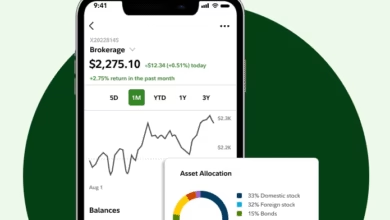
When exploring the world of online trading and investments, you might come across the term “offshore brokers.” But what exactly are they, and how do they differ from the brokers you might be more familiar with? This article will break down the concept of offshore brokers in a simple and easy-to-understand way.
Understanding Offshore Financial Centers: Where Are These Brokers Located?

Offshore brokers are essentially financial brokerage firms that are located and regulated in countries or jurisdictions different from where the majority of their clients reside. These locations are often referred to as “offshore financial centers” or “tax havens.” Some common examples of such jurisdictions include:
- The Bahamas
- Belize
- The British Virgin Islands
- Cyprus
- Seychelles
These jurisdictions often have different regulatory frameworks compared to countries like the United States, the United Kingdom, or countries within the European Union.
Key Differences: Offshore vs. Onshore Brokers Explained
The main distinction between offshore and onshore (domestic) brokers lies in their regulatory environment and the jurisdiction under which they operate. Here are some key differences:
- Regulation: Onshore brokers are subject to the strict regulations of their home country’s financial authorities (e.g., the SEC in the US, the FCA in the UK). Offshore brokers operate under the rules of their specific offshore jurisdiction, which may have different levels of investor protection and oversight.
- Investor Protection: Regulations in established financial centers often provide more robust investor protection mechanisms, such as compensation schemes in case of broker insolvency. Offshore jurisdictions may offer less comprehensive protection.
- Leverage: Offshore brokers sometimes offer higher leverage ratios compared to onshore brokers due to less stringent regulations. While high leverage can amplify potential profits, it also significantly increases the risk of substantial losses.
- Taxation: Depending on your country of residence and the specific offshore jurisdiction, there might be different tax implications associated with using an offshore broker. It’s crucial to understand these implications.
- Privacy: Some individuals may seek out offshore brokers for perceived greater privacy regarding their financial activities. However, it’s important to note that international regulations are increasingly aimed at transparency.
Potential Advantages of Offshore Brokers: What Attracts Some Traders?

Despite the differences in regulation and investor protection, some traders are drawn to offshore brokers for various reasons:
- Higher Leverage: As mentioned, the potential for higher leverage can be attractive to experienced traders comfortable with increased risk.
- Access to Different Markets: Some offshore brokers may offer access to a wider range of international markets or less commonly traded instruments.
- Fewer Restrictions: Certain trading restrictions that might be in place in some onshore jurisdictions might not apply to offshore brokers.
Important Risks and Considerations When Choosing Offshore Brokers
It’s crucial to be fully aware of the potential risks associated with using offshore brokers:
- Lower Regulatory Oversight: The primary concern is often the less stringent regulatory environment, which can mean fewer safeguards for your funds and investments.
- Difficulty in Dispute Resolution: If issues arise with an offshore broker, resolving disputes can be more challenging due to jurisdictional differences.
- Potential for Scams: While not all offshore brokers are fraudulent, the less regulated environment can unfortunately attract less reputable entities. It’s essential to exercise extreme caution.
- Tax Compliance: You are still responsible for complying with the tax laws of your country of residence, regardless of where your broker is located. Failure to do so can have serious consequences.
Who Might Consider Using an Offshore Broker?

Offshore brokers might appeal to:
- Experienced Traders Seeking High Leverage: Those who understand and are comfortable with the significant risks involved.
- Individuals Seeking Access to Specific Markets: If an onshore broker doesn’t offer the instruments they want to trade.
- Those Seeking Greater Privacy (with caution): While this is a factor for some, it’s important to be aware of increasing international transparency efforts.
However, for most retail investors, especially beginners, the added risks associated with less regulated offshore brokers often outweigh any potential benefits. It’s generally safer to choose a well-regulated onshore broker in your country of residence.
Proceed with Caution When Considering Offshore Brokers
Offshore brokers operate under different regulatory frameworks, which can offer certain advantages like higher leverage but also come with significant risks, including lower investor protection and potential difficulties in resolving disputes. Before considering an offshore broker, it’s crucial to conduct thorough due diligence, understand the regulations of the specific jurisdiction, and carefully weigh the potential risks against your individual trading needs and risk tolerance. For the majority of investors, sticking with well-regulated onshore brokers provides a safer and more secure trading environment.





